
Latest News Regarding
Horn of Africa
Somaliland Police increase their public order expertise with EU and UN support
Somaliland Police increase their public order expertise with EU and UN support




Source Hiiraan Online, Source: Wednesday June 9, 2021
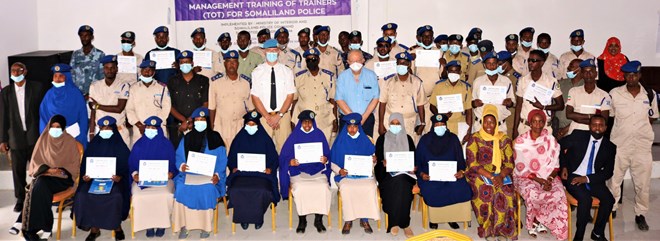
In May officers from the Somaliland Police completed two EU and UN supported courses, on maintaining public order and safety during the election campaign as well as other public events.
advertisements
The courses were a five-day training of trainers, and a convoy and close protection security training to safeguard visiting officials.
The courses were led by the Somaliland Police and the Somaliland Ministry of Interior, with support from the European Union Capacity Building Mission (EUCAP), UNSOM, and the United Nations Development Programme (UNDP), with funding from the European Union and Sweden through the UN Joint Rule of Law Programme.
Training of police trainers in public safety
Fifty Somaliland police officers, including ten women, took part in the training of trainers course, which was held in the Police Academy in Hargeisa in early May.
The officers were selected from each region in Somaliland, and the training aimed to equip them with the skills to train and pass on the knowledge to police colleagues in their districts and regions, on how to maintain public safety on polling day and other wider events.
The Somaliland Police Commissioner, Brigadier General Mahamed Adan Saqadhi (Dabagale), said the course was key for police officers to understand their roles and responsibilities in this area.
“You have chosen to be trainers, and you have the responsibility to pass the knowledge you receive to the other six thousand to seven thousand officers in Somaliland,” he said.
EUCAP police advisors in Hargeisa worked alongside UN experts on the development of the curriculum, which included information on Somaliland’s Police Act and Electoral Law, how police function in a democracy, conflict resolution, human rights, and on how to work with the media. The course also included practical exercises, and as part of EU support to election security, EUCAP advisors delivered a module on the role of civilian security forces during electoral processes.
Ole Toger Rasmussen, EUCAP police advisor, said EUCAP’s support aimed to demonstrate the wide spectrum of roles and responsibilities of police and other security forces during key events.
“EUCAP was honoured to support this course, and to pass on knowledge on how security forces operate and coordinate with each other, and other stakeholders, to guarantee public order, as well as human rights during the process,” he said.
Protection of visiting officials as part of peace and security
To support Somaliland police in ensuring the safety of visiting officials, EUCAP and UNSOM also delivered a two-day course on close protection security. The course included convoy training and practical security procedures for police officers, such as motorcade composition, coordination, response actions, and command and control functions.
Josef Wiklund, UN police advisor in Hargeisa, said the training of trainers and close protection training was important to enhance the Somaliland Police’s professional skills. “Police play a crucial role in protecting democracy and upholding civil society. These trainings have increased the ability of Somaliland police officers to train others in this area. We look forward to continuing our partnership with them, in the context of the UN Joint Rule of Law Project,” Mr Wiklund said.
European missions laud Somaliland elections, call for more women representation
European missions laud Somaliland elections, call for more women representation




Source: Hiiraan Online, Tuesday June 8, 2021
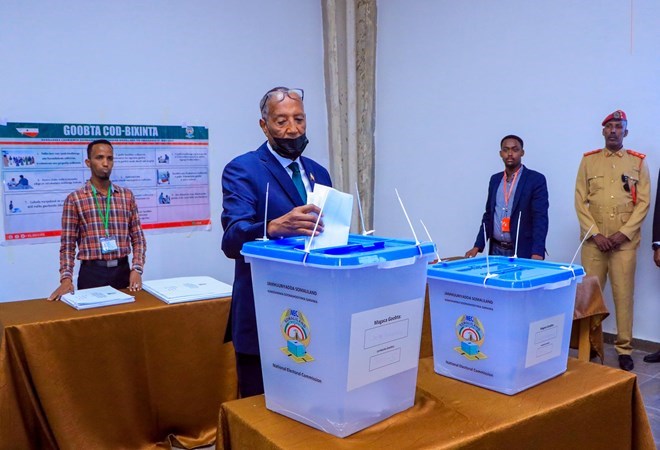
The European Union and other non EU countries with presence in Somalia have applauded the just concluded elections in Somaliland terming them a strong commitment democracy.
The 27 member bloc, UK, Norway and Switzerland commended the people of Somaliland, political parties and government institutions them the electoral commission for the successful conduct of the elections on May 31.
“Through these elections, the people of Somaliland have demonstrated a strong commitment to the electoral process, to political participation and to strengthening democracy,” the statement read in part.
They noted in particular the elections of youth and candidates from minority groups as a key step towards inclusive governance.
The partners, the statement added however expressed regrets over failure to elect women. All the 82 seats in the Lower House of Parliament went to men despite the participation of 13 women candidates in the race.
“We recognise the significant achievements of female candidates during this electoral process, but deeply regret that this has not translated to more women in elected office resulting in decreased women political representation.”
Among those elected to Parliament is Barkad Batuun from a minority clan. Batuun got slightly over 20,000 votes unrivaled in terms of votes by any candidate in the parliamentary race.
Ethiopia: Investigative Report on Ethnic Killings at Mai Kadra
Ethiopia: Investigative Report on Ethnic Killings at Mai Kadra
Source: Reuters published on 7 June 2021 a lengthy investigative report titled “How Ethnic Killings Exploded from an Ethiopian Town” by Katharine Houreld, Michael Georgy, and Silvia Aloisi.
This is an account of the ethnic violence that took place in mid-November 2020 at and around Mai Kadra in western Tigray Region. The authors conclude there were two rounds of ethnic killings. The first round was carried out by ethnic Tigrayans against Amhara who were living in Mai Kadra. The second round constituted revenge killings of Tigrayans by Amhara.

Labels: Abiy Ahmed, Amhara, Amhara militia, atrocities, ENDF, Eritrea, Ethiopia, land, Mai Kadra, refugees, Sudan, Tigray Region, Tigrayans, TPLF, war crimes
Saturday, June 5, 2021
Chinese built Ethiopia-Djibouti railway earns 29 mln USD in nine months period
Chinese built Ethiopia-Djibouti railway earns 29 mln USD in nine months period




Source: Xinhuanet, Sunday June 6, 2021

The Chinese-built 752.7 km Ethiopia-Djibouti railway earned 29 million U.S. dollars in a nine-month period, the Ethiopia-Djibouti Standard Gauge Railway Share Company (EDR) disclosed on Friday.
In a statement, EDR said 29 million U.S. dollars was earned from 1.35 million tons of cargo and 15,480 passengers that were transported in the first nine months of the current Ethiopian Fiscal Year (EFY) 2020/2021, which started on July 8.
The Ethiopia-Djibouti railway which connects landlocked Ethiopia to Djibouti port has in recent months robustly resumed operations that had previously been affected by the COVID-19 pandemic.
In May, EDR graduated 34 Ethiopian train drivers who underwent a series of training in Ethiopia and China.
UAE Financial Intelligence Unit signs MoUs with Bangladesh Somalia
UAE Financial Intelligence Unit signs MoUs with Bangladesh Somalia




Source: gulfnews.com, Monday June 7, 2021
Regulators to exchange knowledge on financial crimes
The UAE Central Bank. The Financial Intelligence Unit of the United Arab Emirates has signed MoU with its counterparts in Bangladesh and Somalia to combat financial crimes. Image Credit: Gulf News Archives
Abu Dhabi: The Financial Intelligence Unit of the United Arab Emirates (UAE FIU) has signed two separate Memorandum of Understanding (MoUs) with the Bangladesh Financial Intelligence Unit (BFIU) and the Financial Reporting Center (FRC) of the Federal Republic of Somalia to exchange financial information and expertise, as well as collaborate with relevant authorities and stakeholders to combat financial crimes.Ads By GoogleThe UAE FIU has signed separate agreements with the FRC of Somalia and the BFIU in accordance with the UAE’s overarching objective of combatting money laundering and financing of terrorism, underpinned by mutually beneficial intelligence exchanges with international counterparts.
The MoUs were signed by Ali Faisal Ba’Alawi, Head of the UAE FIU, with Amina Ali, Director of the FRC of Somalia, and Abu Hena Mohammad Razee Hassan, Head of the BFIU, representing their respective jurisdictions.
Commenting on the agreement, Mr. Ali Faisal, Head of the Financial Intelligence Unit for the UAE, said:
“Our undertaking of these agreements with the FRC of Somalia and the Bangladesh FIU further reinstate our efforts to facilitate a robust exchange of knowledge and expertise in the areas of anti-money laundering and combating financing of terrorism, alongside leading international intelligence units,” said Ba’Alawi.
Somalia in good terms with Djibouti despite IGAD report- Foreign Minister
Somalia in good terms with Djibouti despite IGAD report- Foreign Minister




Source: Hiiraan Online, Wednesday June 2, 2021
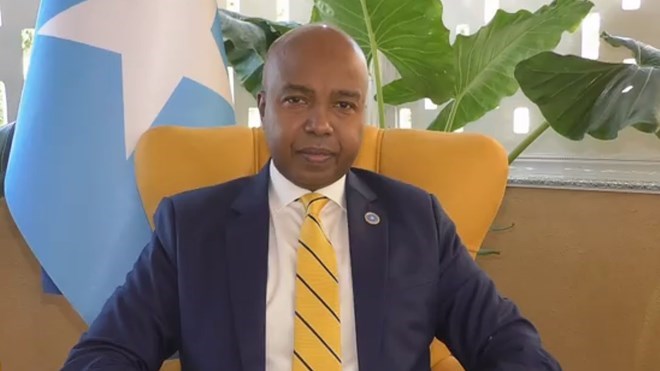
MOGADISHU (HOL) – Somali government has rejected claims Wednesday it had fallen out with Djibouti following the February report which exonerated Kenya of violation of Somalia’s territorial integrity.
Ads By GoogleForeign Affairs Minister Abdirizak Mohamed said Somalia still maintains good relations with Djibouti but said it had registered its protests over the February report.
“For Djibouti, we are two brotherly countries and we are all Somalis, so there is nothing wrong with our diplomatic relations,” said Mohamed. “Somalia attended the inauguration of President Ismail Omar Guelleh.”
Somalia had in February accused Djibouti of colluding with Kenya in writing the IGAD report which cleared Kenya of any wrongdoing.
Djibouti president Omar Guelleh, the current chair of IGAD appointed the team which conducted the fact-finding mission and subsequently did the report.
Prime Minister Mohamed Roble attended the inauguration of Guelleh last month two days after President Mohamed Farmaajo attended the inauguration of his Ugandan counterpart Yoweri Museveni.
Somaliland vote highlights peace in breakaway Somali region
Somaliland vote highlights peace in breakaway Somali region




Source: AP, By RODNEY MUHUMUZA
Monday May 31, 2021
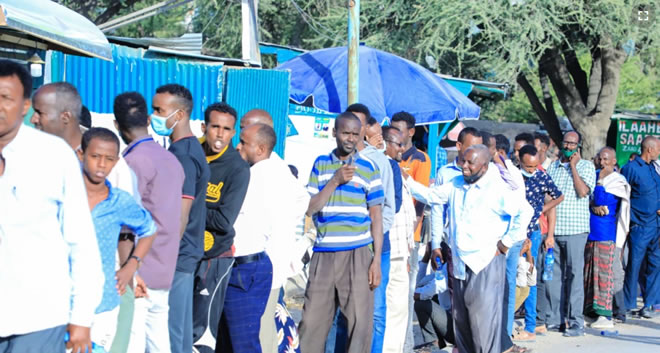
KAMPALA, Uganda (AP) — The people of Somaliland are voting Monday in parliamentary and local elections, highlighting progress in the semi-autonomous region of Somalia that over the years has avoided the destructive violence plaguing other parts of the Horn of Africa country.
More than 1 million of Somaliland’s 4 million people are registered voters. The region has invited international observers for the elections, including political figures from elsewhere in Africa.
Somaliland broke away from Somalia in 1991 as the country collapsed into warlord-led conflict. Despite lacking international recognition, Somaliland has maintained its own independent government, currency and security system.
John Githongo, an anti-corruption campaigner from Kenya who is in the Somaliland capital, Hargeisa, as an observer, in a Twitter post described the region as “the one Somalia with a bottom up democracy that seems to organically work.”Ads By GoogleGreg Mills, director of a South Africa-based group that is observing the polls, said in a statement that the semi-autonomous region “represents an example of an African country which is committed to democracy and development and deserves the support of every African who wants to see progress on this continent.”
Somalia considers Somaliland as part of its territory. Several rounds of talks over possible unification have failed to reach a breakthrough and the region continues to assert its right to independence.
Somaliland’s relative stability over the years has sharpened the sense of failure in Somalia, where deadly attacks by Islamic extremists are frequently reported. Elections due there in February failed to take place because of the lack of agreement on how the vote should be carried out.
Talks between Somalia’s federal government and regional leaders that began in March broke down in early April, precipitating a political crisis that deepened when the lower house of parliament adopted a special law extending the terms of current office holders for two years and abandoned an agreement last year.
The decision sparked widespread opposition, leading to the mobilization of militias, exposing divisions within Somali security forces, and resulting in violent clashes on April 25.
Following the clashes, President Mohamed Abdullahi Mohamed earlier this month asked the lower house of parliament to reverse its actions that included extending his mandate for two years.
Somalia announced last week that federal authorities had reached an agreement with regional leaders to hold indirect elections within 60 days.
Somaliland leaders urge peace as thousands line up to vote
Somaliland leaders urge peace as thousands line up to vote




Source: Hiiraan Online, Monday May 31, 2021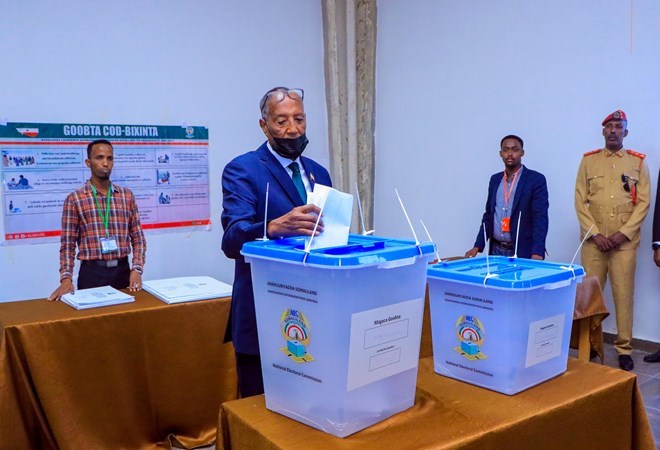
HARGEISA (HOL) – Thousands of voters in Somaliland headed to the ballot Monday morning to elect MPs and local government representatives as leaders called for peace.
Ads By GoogleQueues build up in various regions of the breakaway territory amid enthusiasm as international media turned focus to Somaliland.
Earlier, president Muse Bihi and Waddani party leader Abdirahman Irro expressed optimist noting today’s vote was a vindication of growing democracy and peace.
“Vote peacefully; these are two important electoral processes, all eyes are on us, please execute your rights in good manner,” Bihi said while addressing journalists at Labour House alongside Irro.
On his part, the Waddani leader was enthusiastic about the exercise.
“I am pleased today that I voted for the two separate candidates I have chosen from the candidates vying for house of representatives and councilor,” Irro said.
The opposition and the government have presented a united front in ensuring the exercise goes on successfully as the breakaway region seeks international recognition.
Voting is taking place in 2709 polling stations spread in 23 districts.
Polling stations will be closing Monday evening to pave way for counting.
Ethiopia: Assessment of Upcoming Election
Ethiopia: Assessment of Upcoming Election
Source: The International Republican Institute and National Democratic Institute published on 13 May 2021 a document titled “IRI-NDI Virtual Pre-Election Assessment Delegation for the 2021 Ethiopian Elections.”
The document was written when the date for the Ethiopian election was 5 June 2021, a date that has moved to 21 June. IRI and NDI concluded that the electoral environment presents acute challenges. Nevertheless, there is an opportunity for the elections to be a positive step and to potentially serve as the foundation for more credible processes in the future.
Possible Additional US Sanctions on Ethiopia and Eritrea
Possible Additional US Sanctions on Ethiopia and Eritrea
Source: Reuters published on 27 May 2021 an article titled “US Warns of Further Action against Ethiopia, Eritrea over Tigray” by Daphne Psaledakis and Patricia Zengerle.
The US acting assistant secretary of state for African affairs testified before the US Senate that the United States is looking at a range of other sanctions on Ethiopia and Eritrea if those stoking conflict in Ethiopia fail to reverse course. He added while ethnic conflict in Tigray is the worst in Ethiopia, there are also attacks on ethnic Amhara, Gumuz and Oromo.

Labels: Amhara, atrocities, Eritrea, Eritrean Defense Forces, Ethiopia, ethnic conflict, Gumuz, human rights, Oromo, Tigray Region, TPLF, US
Egyptian president visits Djibouti, builds case on Nile dam
Egyptian president visits Djibouti, builds case on Nile dam




Source: AA, Friday May 28, 2021
By Mohammed Dhaysane
Al-Sisi, Djiboutian counterpart discuss bilateral, regional issues
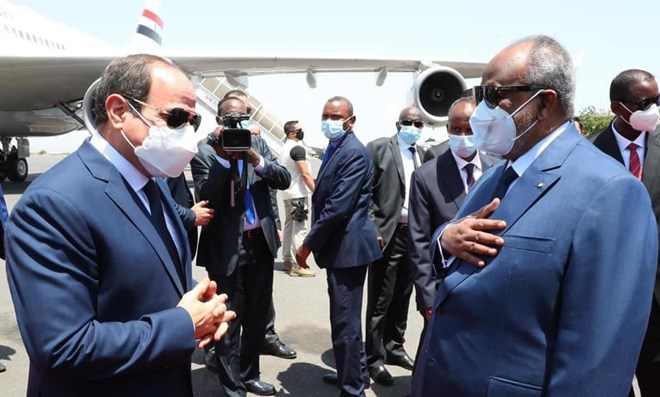
MOGADISHU, Somalia – Egyptian President Abdel Fattah al-Sisi Thursday arrived in the Djiboutian capital on a state visit to the tiny strategic Horn of African nation.
Al-Sisi met his newly-reelected Djiboutian counterpart, Ismail Omar Guelleh, and discussed bilateral and regional issues, including the Ethiopian renaissance dam on the Nile.Ads By Google“I stressed Egypt’s rejection of any attempt to impose a fait accompli through unilateral measures that disregard the interests and rights of the two downstream countries,” Sisi said during a news conference in Djibouti.
Egypt and Djibouti would intensify cooperation on matters related to the security of the Red Sea.
According to Djiboutian local media Ismail Omar Guelleh, who was recently elected as president for a fifth term, expressed keenness on having Egyptian private investments in his country.
Analysts believe the Egyptian president’s visit to Djibouti is significant given the current political situation in the Horn of Africa region.
Rashid Abdi, an analyst, told Anadolu Agency over the phone that Cairo is developing strategic and diplomatic ties in the Horn of Africa and East Africa region to build a new alliance.
“Sisi’s visit to Djibouti, which borders Ethiopia, is significant in view of the renaissance dam crisis. Cairo signed a defense pact with Kenya yesterday and it also established a good relationship with its immediate neighbor Sudan and now Djibouti,” Abdi said.
Djibouti, bordering Somalia in the south and the Red Sea and Gulf of Aden in the east, is a small country located in the Horn of Africa.
Somalia to head to the ballot in 60 days-new agreement
Somalia to head to the ballot in 60 days-new agreement



Source: Hiiraan Online, Thursday May 27, 2021
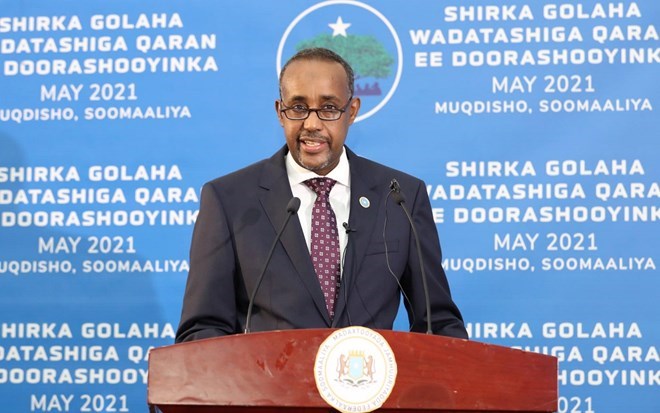
MOGADISHU (HOL) – Somalia will head to elections in 60 days, a new deal signed by the country’s leadership Wednesday has revealed bringing to an end several months of negotiations and bitter exchanges between the Federal Government, sections of the Federal Member States and the opposition.
Ads By GoogleAccording to the agreement, both levels of governments will coordinate on the electoral process and prepare the country for elections in 60 days from now meaning Somalis will be electing new leaders in August.
The Federal Indirect Elections Team (FIET) and its regional level counterparts will prepare elections calendar, the agreement reads in part. Some of the other issues dealt with in the new agreement include security and administration of Gedo region.
A committee drawing membership from all the federal member states except Jubbaland will be constituted and tasked with nominating a commissioner and deputy for Gerbaharey district within 30 days and submit the names to Jubbaland president Ahmed Madobe for appointment.
The agreement also provides a solution to the FIET composition which had been contested by the opposition. It provides that contested names shall be submitted to the Prime Minister who will in turn transmit to the Federal Member States for replacement.
Security of the elections will be the responsibility of Somali Police Force and AMISOM and will be headed by the Prime Minister. A nine-member committee led by the Prime Minister will draw membership from Somali Police Force and AMISOM.
Lastly on the issue of Somaliland, Prime Minister Mohamed Roble shall be responsible for the elections of Somaliland representatives ‘on the recommendation of the Speaker of the Upper House and the Deputy Prime Minister.
Senate speaker Abdi Hashi shall nominate 4 members to the Somaliland Electoral Team SEIT}, one member to the Federal Electoral Commission of Somaliland {FEIT} and one member to the Dispute Resolution Committee, the agreement reads.
UN official: Conflicts make controlling COVID-19 more difficult
UN official: Conflicts make controlling COVID-19 more difficult



Source: AP, Thursday May 27, 2021
By Edith M. Lederer
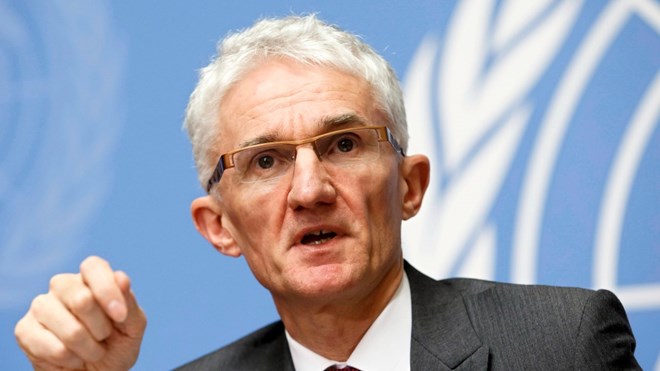
Mark Lowcock, UN Under-Secretary-General for Humanitarian Affairs and Emergency Relief Coordinator, speaks during a press conference at the European headquarters of the United Nations in Geneva, Switzerland on December 4, 2018. THE CANADIAN PRESS/AP, Keystone – Salvatore Di Nolfi
UNITED NATIONS — Despite last year’s UN call for global ceasefires to tackle the COVID-19 pandemic, many conflicts never stopped including in Syria, Yemen and Congo and new ones erupted making it more difficult to control the spread of the virus and care for infected people in many countries, the UN humanitarian chief said Tuesday.
Mark Lowcock stressed the link between conflict, COVID-19, and health care at a virtual Security Council meeting on civilians caught in conflict.Ads By GoogleIn March 2020, as the pandemic was starting to circle the globe, UN Secretary-General Antonio Guterres called for global action “to put armed conflict on lock-down and focus together on the true fight of our lives” against “a common enemy– COVID-19.”
While there were some positive responses, Lowcock said deadly conflicts continued and emerged or got worse including in Ethiopia, Mozambique and between Armenia and Azerbaijan, contributing to a rise in the number of people forcibly displaced in 2020.
“At the same time, insecurity, sanctions, counter-terrorism measures and administrative hurdles hindered humanitarian operations,” he said, and the pandemic made aid deliveries more difficult because of suspended flights, border closures, quarantine measures and lockdowns.
Lowcock noted “multiple reports of atrocities” against civilians caught in conflicts during the pandemic.
He singled out the dozens of schoolgirls and civilians killed and injured in an attack on a high school in Afghanistan earlier this month, reports of mass rapes and killings in Ethiopia’s Tigray region, and the just ended conflict between Israel and Gaza’s Hamas rulers that saw over 200 deaths, mainly Palestinians.
During the pandemic last year, he said, the threat of famine re-emerged including in northeast Nigeria, parts of Africa’s Sahel region, South Sudan and Yemen — all conflict areas.
“By the end of 2020, nearly 100 million people faced crisis or worse levels of acute food insecurity as a result of conflict,” he said. “That was up from 77 million the year before.”
Lowcock also cited the impact of conflicts on civilians in urban areas from explosive devices, on farmers from the destruction of agricultural land, and on entire populations from attacks on medical care.
“Last year, attacks on health care across 22 conflict-affected countries killed 182 health workers,” with the highest numbers losing their lives in Burkina Faso, Congo, Somalia and Syria, he said.
In a two-month period this year, Lowcock said, 109 violent incidents against health care were documented in Myanmar, where a military coup took place on Feb. 1, “accelerating the collapse in the public health-care system when many people needed it most.”
And in Mozambique’s Cabo Delgado province, which has faced attacks from Islamic extremist rebels, over a third of health facilities were damaged or destroyed when hostilities worsened and health workers fled, leaving thousands of people without a nurse or a doctor, he said.
Peter Maurer, president of the International Committee of the Red Cross, cited its recent report “showing the impacts of COVID-19 on communities shouldering the double burden of war and disease.”
“While the need for robust health care systems has perhaps never been greater, paradoxically, health care is under attack,” he said.
Maurer told the council that five years after its members adopted a resolution demanding an end to impunity for attacks on health care “our observations in 40 countries affected by conflict show that attacks on health care have gone unabated,” and cyber attacks on healthcare facilities have increased.
Both Maurer and Lowcock urged the Security Council and the broader international community to focus their energy on changing the way combatants behave in conflicts.
“We need political solidarity, investment in basic infrastructure and services,” Maurer said. “We need better protection for civilians and more substantive and broader support for humanitarian action.”
Somalia reaches agreement paving way for elections – Foreign Minister
Somalia reaches agreement paving way for elections – Foreign Minister




Source: Reuters, Wednesday May 26, 2021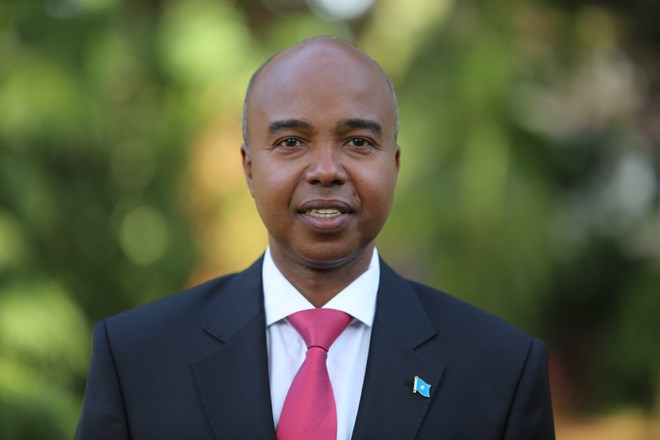
Foreign Minister Mohamed said among the sticking points resolved was the formation of an election committee, whose absence had prevented the election of new legislators in December.
Somalia’s political leaders have reached an agreement that will pave way for elections, its Foreign Affairs Minister said on Tuesday, ending months of deadlock that at times turned violent.Ads By GooglePresident Mohamed Abdullahi Mohamed’s term expired in February, but wrangling over elections meant a new group of lawmakers was not selected in December to choose a new president.
To resolve the deadlock, Prime Minister Mohamed Hussein Roble met with the presidents of five regions to address their concerns over the election’s conduct.
“We have now reached an agreement that will lead Somalia to free and fair elections.
Going forward Somalia needs to have a predictable transition based on elections that is inclusive, credible, free and fair,” Abdirizak Mohamed said during a UN meeting on Somalia.
“This is a challenge and opportunity which the Somali people, government and partners must capitalise to ensure sustainable development and country.”
Foreign Minister Mohamed said among the sticking points resolved was the formation of an election committee, whose absence had prevented the election of new legislators in December.
In April, the lower house of parliament voted to extend the president’s four-year term by another two years.
The Senate rejected the move, provoking a political crisis.
The political crisis had raised fears that Al Qaeda-linked Al Shabaab insurgents could exploit a security vacuum if state forces split along clan lines and turn on each other.
In late April, troops opposed to President Mohamed’s extension of term in office briefly seized key points in the capital, raising fears of a complete disintegration of the national army along clan lines.
The soldiers have since returned to their barracks.
The foreign minister said a more comprehensive statement was due to be given on Thursday.
UN fund to help IGAD countries harmonize remittance policies
UN fund to help IGAD countries harmonize remittance policies




Source: Xinhuanet, Tuesday May 25, 2021
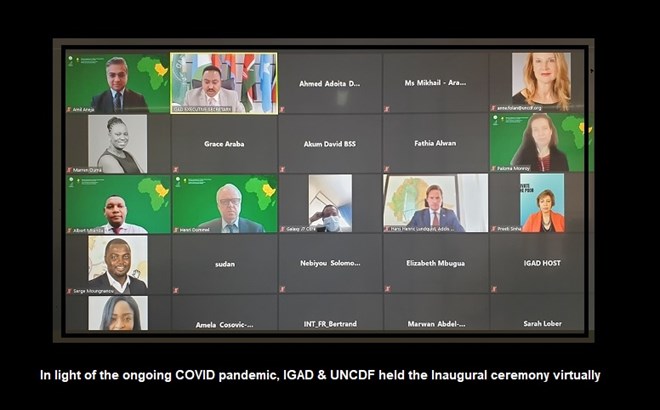
UNITED NATIONS, May 24 (Xinhua) — The Intergovernmental Authority on Development (IGAD) and the UN Capital Development Fund (UNCDF) announced Monday that they have entered into a two-year agreement to support the harmonization of remittance policies across IGAD countries.
In close collaboration with the IGAD member states of Djibouti, Eritrea, Ethiopia, Kenya, Somalia, South Sudan, Sudan and Uganda, and with the IGAD Secretariat’s technical experts, UNCDF will map out all the relevant policies and regulations within each IGAD country. The team will then analyze them to see contradictory or inconsistent guidelines, suggest priority areas for harmonization, and propose concrete steps for implementation, said IGAD and UNCDF in a joint press release.Ads By Google“These efforts are all ultimately aimed at keeping remittances flowing in this region where they are vitally important, and shifting more of them from the informal unregulated networks into safe, regulated, and transparent channels,” it said.
Along with harmonizing the policy and regulatory frameworks that govern remittance flows, the IGAD/UNCDF initiative will seek to build a robust body of market research, with data about both the supply and demand for remittance services. Key to the initiative will also be the understanding of how remittances, if shifted from cash to digital channels, could be the gateway for migrants and their families to other value-added financial products that could build their resilience and financial health, said the press release.
Toward that end, IGAD and UNCDF will also facilitate peer-learning exchanges between key stakeholders including that of the IGAD Secretariat, central banks and other relevant authorities together with remittance service providers and other private-sector actors so that all stakeholders may learn first-hand about each other’s constraints, priorities, goals, and incentives, it said.
Over 1 million women and children in Somalia to benefit from $9m Swedish aid
Over 1 million women and children in Somalia to benefit from $9m Swedish aid




Source: Hiiraan Online, Tuesday May 25, 2021
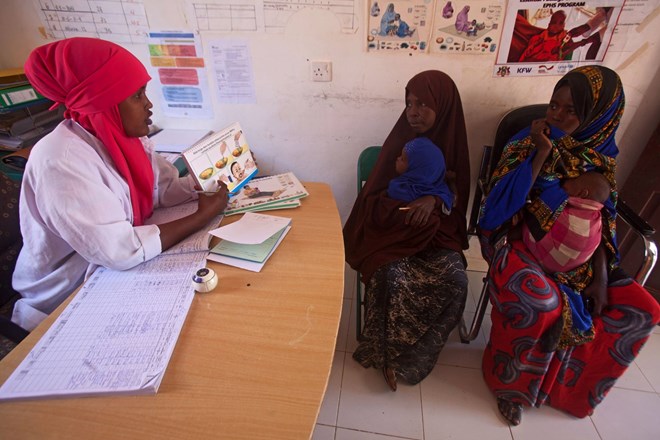
MOGADISHU (HOL) – The Swedish government has announced $9 million to support child and maternal health in Somalia.
According to a statement from the Swedish embassy in Mogadishu, the support which is in partnership with UNICEF targets over one million children and women in Somalia to access improved health services and reduce child and maternal deaths.
“Children deserve to have a healthy start in life and to grow up in a safe environment where their protection rights are upheld,” said Ambassador Staffan Tillander, the Swedish Ambassador to Somalia. “This funding will strengthen access to essential health and protection services and underscores Sweden’s long-term commitment to improving the lives of Somali women and children.”
Ads By GoogleThe funds will also boost the ongoing COVID-19 vaccination which is currently at 40% uptake. Somalia has since received 300,000 doses from the global Covax programme.
“It is critical that we scale up the COVID-19 vaccination campaign to reach the most vulnerable populations and frontline workers in Somalia. The fight against COVID-19 is a global one and part of this funding will help support UNICEF and WHO to speed up the vaccination effort so that the second wave of COVID-19 is contained,” added the Ambassador.
UNICEF acting country representative Jester Moller hailed the contribution noting it will go a long way in improving child health in Somalia.
“UNICEF is extremely grateful to the Government of Sweden for this generous contribution,” said Jesper. “Every child has a right to health and protection. This multi-year funding provides us with the much-needed opportunity to work harder on long-term solutions and do more to keep Somali children and their families healthy and safe especially in the midst of the COVID-19 pandemic.
Somalia has one of the highest child and maternal mortality rates in the world recording 732 maternal deaths per 100,000 live births.
UK to send 250 specialist troops to Somalia to battle Al Shabab terrorists
UK to send 250 specialist troops to Somalia to battle Al Shabab terrorists




Source: Express, Sunday May 23, 2021
By MARCO GIANNANGELI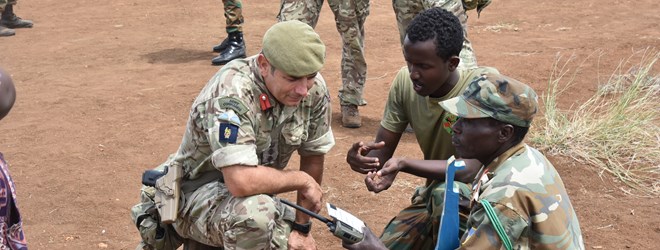
Source: MoD
BRITAIN is to send 250 troops to Somalia as the country battles against Al Shabab terrorists. The move, to take place “within the next 12 months:”, will represent the first official engagement of the new Army Ranger regiment.
It comes just months after the creation of the Special Operation Brigade was announced by former SAS commander General Sir Mark Carleton-Smith, who currently heads the British Army. Under his vision, four “all arms” battalions, each containing 250 special purpose Ranger units, will support the SAS and deploy on training and advisory missions across the globe. Gen Carleton-Smith revealed his future plans while speaking at the Atlantic Council, a non-partisan organisation that galvanises US leadership and engagement in the world.Ads By Google“Within the next 12 months I want to stand up the first Ranger battalion in order to act as the vanguard for Army’s Special Operations Brigades“ he said.
“I want to see it deployed potentially in east Africa in support of our regional East African partners.
Though he did specify where it would be sent or for how long, sources last night confirmed the troops are to be based in Somalia, where they will train the country’s special forces in counter insurgency tactics to allow them to take on All-Shabab.
Al Shabab is affiliated to Al Qaeda and currently battling the United Nations backed government in Somalia where government troops are reported to be poorly trained and equipped.
Banned as a terrorist group by both the US and the UK, it is believed to have between 7,000 and 9,000 fighters, many of whom are young men with little chance of employment.
Somalia’s government blamed it for the killing of at least 500 people in Mogadishu in October 2017 during what has been labelled as Africa’s biggest terrorist bomb.
Al Shabab also carried out a massive attack on a Kenyan military base in el-Ade, Somalia, in January 2016 which killed 180 soldiers.
It has also staged several attacks in Kenya, including the 2015 massacre at Kenya’s Garissa University, near the border with Somalia.
A total of 148 people died when gunmen stormed the university at dawn and targeted Christian students.
The US has issued a $6m (£4.5m) bounty for information leading to the capture of the group’s leader Ahmad Umar, also known as Abu Ubaidah.
An announcement confirming Somalia as the location of the Army Rangers’ first operation is expected to be made during next month’s G7 summit in Cornwall.
“Our people will replace US Special Forces who have been training Somali forces,”’ said a source last night.
“It will be challenging, but the Rangers have been formed for precisely this sort of role.”
Qatar Working to Reassert Itself in Horn of Africa
Qatar Working to Reassert Itself in Horn of Africa
Source: The Stimson Center posted on 19 May 2021 a commentary titled “Qatar and Somalia-Kenya Relations: Projection of Mediation Power in the Horn of Africa” by Desiree Custers.
Qatar played a key role in the recent brokering of the resumption of diplomatic relations between Kenya and Somalia. Qatar is clearly trying to reassert itself in the Horn of Africa following setbacks at the hands of Saudi Arabia and the UAE.

Labels: diplomacy, Horn of Africa, ICJ, Kenya, maritime boundary, mediation, Qatar, Saudi Arabia, Somalia, Somaliland, Turkey, UAE
Ethiopia to Begin Power Generation at Blue Nile Dam during Upcoming Rainy Season
Ethiopia to Begin Power Generation at Blue Nile Dam during Upcoming Rainy Season
Source: The Associated Press published on 21 May 2021 an article titled “Ethiopia Set to Start Generating Power from Blue Nile Dam.”
Ethiopia plans to begin generating power from the Grand Ethiopian Renaissance Dam on the Blue Nile during the upcoming rainy season between June and August. It is not clear if this is just a test or the beginning of continuing power generation. The dam is 80 percent complete and expected to reach full generating capacity in 2023. 0 commentsLabels: Blue Nile, Egypt, Ethiopia, GERD, hydropower, Nile waters, Sudan
US About to Put Visa Restrictions on Ethiopian and Eritrean Officials
US About to Put Visa Restrictions on Ethiopian and Eritrean Officials
Source: Foreign Policy posted on 21 May 2021 an article titled “Biden Administration Plans Visa Restrictions on Ethiopian Officials Over Tigray” by Robbie Gramer.
The Biden administration is planning to target Ethiopian and Eritrean officials with visa restrictions as part of an effort to encourage change in policy in Tigray Region.0 commentsLabels: Abiy Ahmed, atrocities, Biden administration, Eritrea, Eritrean Defense Forces, Ethiopia, GERD, IMF, sanctions, security assistance, Sudan, Tigray Region, TPLF, visas, war crimes, World Bank

